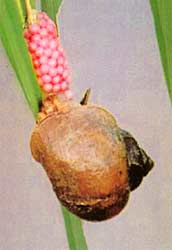The advancing invasion of several Pomacea
species and the damage that these snails can cause to the food production (mainly
rice), makes it more and more important to focus on good pest management. Delivering
adequate information about apple snails, and improving knowledge about pest
management is essential to control this growing threat.
Request for pest management information
If anyone has good suggestions about golden apple snails pest management, please
Especially suggestions/non published material in the field of natural (botanical)
derived pesticides and vector (parasite) based methods are very welcome.
Detailed alert information about the golden snail pest
- Pomacea canaliculata
is spreading rapidly accross Asia during the last decades and is now
on the verge of entering India.
The results of such an invasion into rice fields can be devastating for the
food production. Therefore it's very important to be alert in this matter
and report any new spreadings. In order to achieve this, an 'alert poster'
has been produced to alert farmers and other people involved in the rice production
and trade.
You can find this poster below. You are encouraged to spread this poster in
any form.
Pomacea canaliculata Asia: pest
alert poster
Pomacea canaliculata Asia: pest
alert poster (Adobe PDF format)
- Apple snail eradication section.
In this small guide, some general methods and techniques are presented about
how to keep apple snail populations under control. This documeny is directed
both to aquarium hobbiist as well people involved in rice and taro production.
- The fire ant as biological
control agent?
Can the fire ant be use as a biological method to control Pomacea canaliculata
populations in the Asian rice fields? The observation that the fire ant Solenopsis
geminata predates on the eggs of the apple snail Pomacea canaliculata
suggest a possible use of this ant as a biological agent. However, cautions
should be taken in this approach as the fire ant can become a pest itself.
- Long-horned grasshoppers (Conocephalous
longipennis) eat golden kuhol eggs
The long-horned grasshopper (Conocephalous longipennis de Haan), locally
known as tipaklong na mahaba ang sungot, is reported to predate on the eggs
of the golden kuhol snail. The news article recommends that rice farmers should
be informed on the importance of conserving egg predators such as the long-horned
grasshoppers.
Related pages on applesnail.net

Links:



![]() 'Apple
snails as bio-agent' section, 'Pomacea
canaliculata' section, 'Fire
ant (Solenopsis geminata) predation' on eggs section.
'Apple
snails as bio-agent' section, 'Pomacea
canaliculata' section, 'Fire
ant (Solenopsis geminata) predation' on eggs section. ![]() 'Apple snails
as food ' section, 'Recognizing
apple snails' section, 'Bibliography
on the golden apple snail' section.
'Apple snails
as food ' section, 'Recognizing
apple snails' section, 'Bibliography
on the golden apple snail' section.